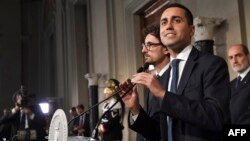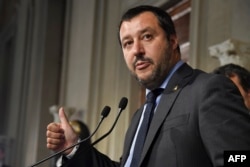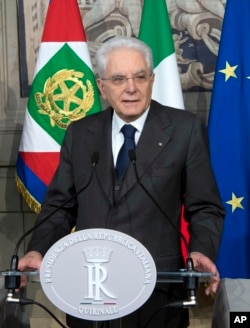After weeks of post-election wrangling, Italy appears set to get a new-generation populist government amid fears it might bankrupt the country and clash with Brussels by violating European Union spending rules.
Migrants in Italy are also fearful of what might transpire if, as seems now likely, the rival populist parties Movimento Cinque Stelle (M5S) and the Northern League form a coalition government. Under plans being considered by the parties, thousands of illegal migrants from sub-Saharan Africa and the Middle East face being rounded up and expelled.
On Sunday, the Northern League leader, Matteo Salvini, tweeted that Gypsies "are not happy unless they are stealing." Salvini campaigned during the election earlier this year on a promise to instigate mass repatriations.
The 45-year-old could become the country's interior minister, which would put him in charge of the national police and security agencies. He has said he wants to start mass deportations quickly with an initial target of 200,000. Italian authorities estimate that at least half-a-million migrants live illegally in Italy.
The two parties Monday presented their policies and recommendations for a prime minister to the country's president, Sergio Mattarella, who has the final word on nominating a premier. On Saturday, Mattarella reminded the parties in a speech that he's not obligated to accept their recommendations, and he appears uncomfortable with the two picks the parties have come up with — both are academics.
Mattarella, who met the populist party leaders Monday, also has issued warnings about the agreement that the rival populists have reached when it comes to spending, saying Italy must keep to the EU's spending rules.
The president on Saturday warned he had the power to strike down laws he believed to be inconsistent with the constitution, including those that boosted spending without offsetting budget cuts.
The anti-establishment M5S, led by 31-year-old Luigi Di Maio, and the anti-immigrant League have been locked in off-and-on negotiations since inconclusive March 4 elections in which establishment parties were trounced. Together, the populists can muster a majority in both chambers of Italy's parliament: M5S won 32 percent of the vote, and the League 17 percent.
Economic promises made by both parties appear incompatible with Europe's budget rules and institutional investors are watching closely. In their talks trying to bridge their ideological divide — M5S is considered to be more on the left of the political spectrum but shares the League's Euro-skepticism — the party leaders toned down their spending plans but still appear to be at odds with Brussels.
According to Italian media reports, the parties have agreed to roll back increases to the age of retirement, a reform which helped Italy survive the eurozone crisis, and to provide a government-funded universal basic income to the poor. They also intend to cut taxes.
EU clash
Despite the scaling back of their plans, the parties in government would likely prompt a clash with the EU by defying the previous government's agreements with Brussels to reduce Italy's budget deficit, say analysts. Salvini has in the past said the introduction of the euro was an error.
Germany's European affairs minister, Michael Roth, said he was curious to see what would happen next. "I hope that a government is built with which it is possible to live well with the European Union," he told reporters in Brussels.
Salvini on Sunday appeared in no mood to soften his combativeness when it comes to the EU, saying Italians "expect a government that respects their votes and the election result."
He argues the euro currency "only benefits Germany." Italy's mainstream economists worry that an M5S-League government will add considerably to Italy's huge public debt, which is now running at 132 percent of its gross national product.
EU populist concerns
EU leaders are expressing concern about the seismic populist political changes under way as Italy edges closer to forming its first anti-establishment government.
"Being a good Italian also means being a good European citizen. It needs to be repeated out loud, especially now," EU parliament head Antonio Tajani said at a conference in the Tuscan city of Florence."Leaving the single currency would be shooting oneself in the foot," he added in what appeared to be a direct warning to the League.
Gian Marco Centinaio, one of the League negotiators in the coalition negotiations, said a deal on a government program had been reached, barring "a few commas." But other negotiators cautioned there are still disagreements on who should be the new prime minister among the populists, aside from the objections of Italy's president.
"Obviously, we are writing history, and it takes a bit of time," M5S leader Di Maio, told reporters Sunday. "There's an excellent climate at the table. We are tackling very important issues."
If the two parties and Italy's president agree on a prime minister, the new government would face a confidence vote in Italy's two houses of parliament. M5S has also pledged to put its deal with the League to an online vote among its party members.






